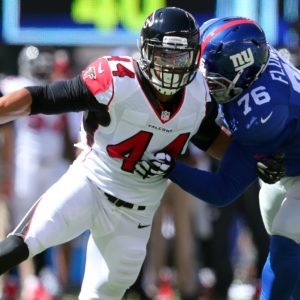Anyone who follows me on Twitter knows this: I’m very into politics, reality TV, and football. When football season starts, I send a notice to my friends that I will not be available on Sunday, Monday and Thursday nights and the occasional Saturday. I no longer go to Super Bowl parties or host them because I am intently focused on the game and not interested in small talk with guests.
To say that I’m a football fan (specifically of the New York Football Giants) would be a huge understatement. However, it’s with this fandom that I worry about the current state of the NFL. It’s no secret that ratings are down. But I doubt that even understanding why fewer people are watching football these days would do much to change the current behavior of the league.
As much as I love football, even I can see the disturbing trends that are pushing fans away. We could start with the exorbitant costs of attending a game. Going to just one game can cost hundreds of dollars: the tickets, the cost of getting to the stadium, food and beverages, and possibly buying merchandise for you or your family. This alone is out of many fans’ reach. As someone who is fortunate enough to attend a Giants game almost every year, I really think that being able to attend the games deepens a fan’s commitment to their team for the rest of the season.
So perhaps the first step toward boosting ratings for games is to make attending more affordable for more people. Because even though ratings may be down, NFL teams and owners are making more money than ever. Fans see shiny new stadiums being built — often with taxpayer dollars at the expense of other important expenditures — but don’t always see an improved fan experience. And if they do see one (Jumbo screens! Beer gardens!), they are usually paying for it somehow.
Fans aren’t blind to the fact that while owners’ pockets are getting fatter, they have to empty their wallets to bring their family to a game.
Then of course, there’s the actual experience of watching the games itself. For all the technological advancements the NFL touts today, they still haven’t quite figured out that the way Americans consume entertainment has changed greatly. Of course, I’m a super fan, so I will watch a game from start to finish. Yet even I get annoyed by the number of commercials during a game. Touchdown scored, commercial break. Kick off to the opposing team, commercial break.
There is no reason to squeeze in an additional 15-second commercial other than the greedy desire to squeeze as much ad revenue into games as possible. If there is one consistent complaint I hear from friends who like football but who no longer watch it, it’s that the games are too long, there’s too much time between plays, and far too many commercials.
The final things are the most controversial, and that’s the issues of injuries and domestic abuse.
More and more, evidence is emerging showing a link between the severe head trauma some players experience and debilitating disease and injury suffered later in life. As a fan, it’s hard for me to love and watch this sport knowing not only that some people are being harmed by it, but also that owners and the NFL have spent millions of dollars to downplay or outright hide evidence of the connection.
Meanwhile, the recent incidents of domestic violence among players and the terrible way the league has handled these horrific incidents has been atrocious.
These two things alone have no doubt stopped many could-be fans from watching. Until the NFL takes concrete steps toward addressing both problems, they will continue to lose viewers.
Let’s be clear: the NFL is doing just fine, generally speaking. It has various revenue streams that keep the owners and the league’s commissioner, Roger Goodell, nicely compensated. But at some point, diminished ratings and fans will catch up to them. There are plenty of concrete steps the NFL can take to stop this problem before it really begins to affect the bottom line. But that would require the owners and the league to think more broadly about these issues than they’ve proven to be capable of thus far.
Until then, I remain a fan, albeit a skeptical one.

